Ketoadd Tablet 20's
MRP ₹523
(Inclusive of all Taxes)
₹78.5 Cashback (15%)
Provide Delivery Location
Online payment accepted
 Prescription drug
Prescription drugWhats That
Manufacturer/Marketer :
Consume Type :
Expires on or after :
Return Policy :
About Ketoadd Tablet
Ketoadd Tablet is used in the treatment of chronic kidney disease. Chronic kidney disease (CKD) is a long-term illness where the kidneys do not function properly. High blood pressure, diabetes, high cholesterol, kidney infections, renal inflammation, recurring kidney stones, an enlarged prostate, and long-term, regular use of certain medicines such as lithium and non-steroidal anti-inflammatory drugs are the common causes.
Ketoadd Tablet contains Alpha Ketoanalogue, Histidine, Lysine, Threonine, Tryptophan, Tyrosine, Nitrogen, and Calcium. Ketoadd Tablet works by preventing the unnecessary increase in urea levels in the blood and improving the metabolism of proteins. Thereby improving renal function.
You are advised to take Ketoadd Tablet for as long as your doctor has prescribed it for you, depending on your medical condition. Certain common side effects include nausea, vomiting, diarrhoea, and abdominal pain. Most of these side effects do not necessitate medical treatment and will subside with time. However, if you are experiencing these adverse effects regularly, you should consult your doctor.
Please inform your doctor if you are allergic to any of the ingredients. If you are pregnant or breastfeeding, you should seek medical advice before using Ketoadd Tablet . Avoid drinking alcohol while taking Ketoadd Tablet to avoid undesirable side effects. Keep your doctor updated about your health condition and medications to rule out any negative effects.
Uses of Ketoadd Tablet
Directions for Use
Key Benefits
Ketoadd Tablet is used in the treatment of chronic kidney disease. Ketoadd Tablet works by preventing the unnecessary increase in urea levels in the blood and improving the metabolism of proteins. Thereby improving renal function. It is best if taken along with a low-protein diet as it helps delay the progression of kidney diseases.
Storage
- Inform your doctor about the nausea and discuss possible alternatives to the medication or adjustments to the dosage.
- Divide your daily food intake into smaller, more frequent meals to reduce nausea.
- Opt for bland, easily digestible foods like crackers, toast, plain rice, bananas, and applesauce.
- Avoid certain foods that can trigger nausea, such as fatty, greasy, spicy, and smelly foods.
- Drink plenty of fluids, such as water, clear broth, or electrolyte-rich beverages like coconut water or sports drinks.
- Use ginger (tea, ale, or candies) to help relieve nausea.
- Get adequate rest and also avoid strenuous activities that can worsen nausea.
- Talk to your doctor about taking anti-nausea medication if your nausea is severe.
- Record when your nausea occurs, what triggers it, and what provides relief to help you identify patterns and manage your symptoms more effectively.
- Preventing Vomiting (Before it Happens)
- Take medication exactly as prescribed by your doctor. This can help minimize side effects, including vomiting.
- Having a small meal before taking your medication can help reduce nausea and vomiting.
- Talk to your doctor about taking anti-nausea medication along with your prescribed medication.
- Managing Vomiting (If it Happens)
- Try taking ginger in the form of tea, ale, or candy to help alleviate nausea and vomiting.
- What to Do if Vomiting Persists
- Consult your doctor if vomiting continues or worsens, consult the doctor for guidance on adjusting your medication or additional treatment.
- Inform Your Doctor: Notify your doctor immediately about your diarrhoea symptoms. This allows them to adjust your medication or provide guidance on managing side effects.
- Stay Hydrated: Drink plenty of fluids to replace lost water and electrolytes. Choose water, clear broth, and electrolyte-rich drinks. Avoid carbonated or caffeinated beverages to effectively rehydrate your body.
- Follow a Bland Diet: Eat easy-to-digest foods to help firm up your stool and settle your stomach. Try incorporating bananas, rice, applesauce, toast, plain crackers, and boiled vegetables into your diet.
- Avoid Trigger Foods: Steer clear of foods that can worsen diarrhoea, such as spicy, fatty, or greasy foods, high-fibre foods, and dairy products (especially if you're lactose intolerant).
- Practice Good Hygiene: Maintain good hygiene to prevent the spread of infection. To stay healthy, wash your hands frequently, clean and disinfect surfaces regularly, and avoid exchanging personal belongings with others.
- Take Anti-Diarrheal Medications: If your doctor advises, anti-diarrheal medications such as loperamide might help manage diarrhoea symptoms. Always follow your doctor's directions.
- Keep track of your diarrhoea symptoms. If they don't get better or worse or are accompanied by severe stomach pain, blood, or dehydration signs (like extreme thirst or dark urine), seek medical help.
- Drink water or other clear fluids.
- To prevent worsening of pain, limit intake of tea, coffee, or alcohol.
- Include bland foods like rice, toast, crackers, and rice in your diet.
- Avoid lying down immediately after eating as it may cause indigestion or heartburn.
- Avoid acidic and spicy food as it may cause indigestion.
Drug Warnings
Please inform your doctor if you are allergic to Ketoadd Tablet or any other medications. If you are pregnant or breastfeeding, you should seek medical advice before using Ketoadd Tablet . Don't drink alcohol while taking Ketoadd Tablet to avoid undesirable side effects. Keep your doctor updated about your health condition and medications to rule out any negative effects. People with chronic kidney disease (CKD) may need to closely watch sodium and phosphorus levels in their diets, especially if their disease has progressed.
Drug-Drug Interactions
Drug-Drug Interactions
Login/Sign Up
Taking tranylcypromine with Ketoadd Tablet can increase the risk of serotonin syndrome ( high levels of serotonin in body which result in shivering, high fever, diarrhea & muscle stiffness) .
How to manage the interaction:
Taking Tranylcypromine with Ketoadd Tablet is not recommended, but can be taken together if prescribed by a doctor. However, consult a doctor if you experience confusion, hallucination(seeing and hearing things that do not exist), fits, blood pressure alteration, increased heart rate, fever, excessive sweating, shivering or shaking, blurred vision, pain in the muscles or stiffness, incoordination, stomach cramps, nausea, vomiting, and diarrhea. Do not discontinue any medications without consulting your doctor.
Taking Safinamide with Ketoadd Tablet can increase the risk of serotonin syndrome (A condition in which a chemical called serotonin increase in your body).
How to manage the interaction:
Taking Safinamide with Ketoadd Tablet is not recommended as it can possibly result in an interaction, but can be taken together if prescribed by a doctor. However, consult a doctor if you experience confusion, hallucination(seeing and hearing things that do not exist), fits, changes in blood pressure, increased heart rate, fever, excessive sweating, shivering or shaking, blurred vision, pain in the muscles or stiffness, incoordination, stomach cramps, nausea, vomiting, and loose stools. Do not discontinue any medications without consulting your doctor.
Using Ketoadd Tablet together with Sumatriptan might raise serotonin hormone levels in the body, affecting the brain and nerve cells. Increased serotonin hormone can lead to severe side effects.
How to manage the interaction:
Although there is a possible interaction between Sumatriptan and Ketoadd Tablet, you can take these medicines together if prescribed by your doctor. However, if you experience increased heart rate, fever, excessive sweating, shivering or shaking, blurred vision, muscle spasms or stiffness, tremors, incoordination, stomach cramps, nausea, vomiting, and diarrhea call a doctor. Do not discontinue any medications without consulting a doctor.
Co-administration of Ketoadd Tablet and Desvenlafaxine might raise serotonin hormone levels in the body, affecting the brain and nerve cells. Increased serotonin hormone can lead to severe side effects.
How to manage the interaction:
Co-administration of Ketoadd Tablet and Desvenlafaxine can lead to an interaction, it can be taken if advised by your doctor. However, if you experience any symptoms like confusion, hallucination, seizure, increased heart rate, fever, excessive sweating, shivering or shaking, blurred vision, muscle spasm or stiffness, tremors, incoordination, stomach cramps, nausea, vomiting, and diarrhea, consult the doctor immediately. Do not stop using any medications without a doctor's advice.
Coadministration of Paroxetine with Ketoadd Tablet can increase the side effects of paroxetine.
How to manage the interaction:
Although there is a possible interaction between Paroxetine and Ketoadd Tablet, you can take these medicines together if prescribed by your doctor. However, if you experience confusion, hallucination, seizure, increased heart rate, fever, excessive sweating, shivering or shaking, blurred vision, muscle spasm or stiffness, tremors, incoordination, stomach cramps, nausea, vomiting, and diarrhea contact your doctor immediately. Do not discontinue any medications without consulting your doctor.
The combined use of Ketoadd Tablet with clomipramine can cause serotonin syndrome. Serotonin syndrome is a condition in which a chemical called serotonin builds up in your body, causing signs and symptoms ranging from mild (shivering and diarrhea) to severe (muscle rigidity, fever, and seizures).
How to manage the interaction:
Although taking clomipramine and Ketoadd Tablet together can cause an interaction, it can be taken if your doctor has suggested it. However, if you experience symptoms such as confusion, hallucination, seizure, increased heart rate, fever, excessive sweating, shivering or shaking, blurred vision, muscle spasm or stiffness, incoordination, stomach pain, nausea, vomiting, and diarrhoea, consult the doctor. Do not discontinue any medications without consulting a doctor.
When granisetron is taken with Ketoadd Tablet, can increase the risk of serotonin syndrome (condition in which a chemical called serotonin increase in body).
How to manage the interaction:
There may be a possibility of interaction between Granisetron and Ketoadd Tablet, but it can be taken if prescribed by a doctor. However, if you experience any of the following symptoms: confusion, hallucination, seizure, extreme changes in blood pressure, increased heart rate, fever, excessive sweating, shivering or shaking, blurred vision, muscle spasm or stiffness, tremor, incoordination, stomach cramp, nausea, vomiting, and diarrhoea, consult a doctor. Do not discontinue any medications without consulting a doctor
The combined use of Ketoadd Tablet and Doxepin can increase the risk of serotonin syndrome(A condition in which a chemical called serotonin builds up in your body).
How to manage the interaction:
Co-administration of Ketoadd Tablet and Doxepin can lead to an interaction, but it can be taken if your doctor advises. However, if you experience any symptoms like confusion, hallucination, seizure, increased heart rate, fever, excessive sweating, shivering or shaking, blurred vision, muscle spasm or stiffness, tremors, incoordination, stomach cramps, nausea, vomiting, diarrhoea, consult the doctor immediately. Do not stop using any medications without a doctor's advice.
Combining Ketoadd Tablet with Amitriptyline can increase the risk of serotonin syndrome.(A condition in which a chemical called serotonin builds up in your body).
How to manage the interaction:
Although using Ketoadd Tablet and Amitriptyline together may cause an interaction, they can be taken if prescribed by a doctor. Consult a doctor if you have symptoms such as confusion, hallucination, fits, blood pressure alteration, increased heart rate, fever, excessive sweating, shivering or shaking, blurred vision, pain in the muscles or stiffness, incoordination, stomach cramps, nausea, vomiting, and diarrhea. Inform a doctor if you have recently taken amitriptyline. Do not discontinue any medications without consulting a doctor.
When Ketoadd Tablet is taken with Selegiline, may increase the risk of serotonin syndrome (a condition in which a chemical called serotonin increases in your body).
How to manage the interaction:
There may be a possibility of interaction between Ketoadd Tablet and Selegiline, but it can be taken if prescribed by a doctor. If you notice any of these signs - like confusion, hallucination, fits, extreme changes in blood pressure, increased heart rate, fever, excessive sweating, shivering or shaking, blurred vision, muscle spasm or stiffness, incoordination, stomach cramps, nausea, vomiting, and diarrhea-call a doctor. Do not stop using any medications without a doctor's advice.
Drug-Food Interactions
Drug-Food Interactions
Login/Sign Up
Diet & Lifestyle Advise
- It works best when combined with a low-protein diet since it slows the advancement of renal disease.
- People with kidney problems should reduce their sodium intake.
- Olive oil is a good source of fat and low in phosphorus, so it's a good choice for renal problems.
- Bulgur is a whole grain wheat product that is a great kidney-friendly alternative to other high-phosphorus, high-potassium whole grains.
- Blueberries are high in minerals and antioxidants, making them one of the finest foods you can eat.
Side Effects of Ketoadd Tablet
- Increased calcium levels
- Nausea
- Vomiting
- Diarrhoea
- Abdominal pain
Habit Forming
Therapeutic Class
All Substitutes & Brand Comparisons
RX
Chet Alfa Tablet 10's
Trebuchet Life Sciences Pvt Ltd
₹195
(₹17.55 per unit)
25% CHEAPERRX
Nefrosave Keto Tablet 10's
Fourrts India Laboratories Pvt Ltd
₹229
(₹20.61 per unit)
12% CHEAPERRX
Aplaneph Tablet 10's
Dr Dm Medicare Pvt Ltd
₹340
(₹30.6 per unit)
29% COSTLIER
Author Details
We provide you with authentic, trustworthy and relevant information
Drug-Diseases Interactions
Drug-Diseases Interactions
Login/Sign Up
FAQs
Drug-Drug Interactions Checker List
- CIPROFLOXACIN
- TETRACYCLINE
- ESTRAMUSTINE
Special Advise
- Regular check-ups to monitor your condition will also be recommended.
- Food sodium and phosphorus levels may need to be constantly monitored by people with CKD, especially if their kidney disease is severe.
Disease/Condition Glossary
Chronic kidney disease (CKD): It is a condition where the kidneys do not function properly leading to kidney failure. It is usually caused by various conditions such as high blood pressure, diabetes, high cholesterol, kidney infections, kidney inflammation, kidney stones that keep coming back, or an enlarged prostate, long-term, regular use of certain medicines such as lithium and non-steroidal anti-inflammatory drugs (NSAIDs).

Have a query?
Alcohol
Safe if prescribed
You are recommended not to consume alcohol along with Ketoadd Tablet to avoid unpleasant side-effects.
Pregnancy
Consult your doctor
Consult a doctor before using Ketoadd Tablet if you are pregnant. The doctor will prescribe only if the benefits outweigh the risks.
Breast Feeding
Consult your doctor
Consult a doctor before using Ketoadd Tablet if you are breastfeeding. The doctor will prescribe if the benefits outweigh the risks.
Driving
Safe if prescribed
Drive only if you are physically stable and mentally focussed. If you experience drowsiness after taking this medication, you should not drive or operate any machinery or vehicles.
Liver
Consult your doctor
Please consult your doctor before taking Ketoadd Tablet if you have liver problems. Your doctor will weigh the benefits and any potential risks before prescribing.
Kidney
Consult your doctor
Ketoadd Tablet can be taken safely by patients with kidney problems when prescribed.
Children
Safe if prescribed
The safety and efficacy of Ketoadd Tablet in children are not yet determined. Please consult your doctor if you have any concerns.
Recommended for a 30-day course: 2 Strips

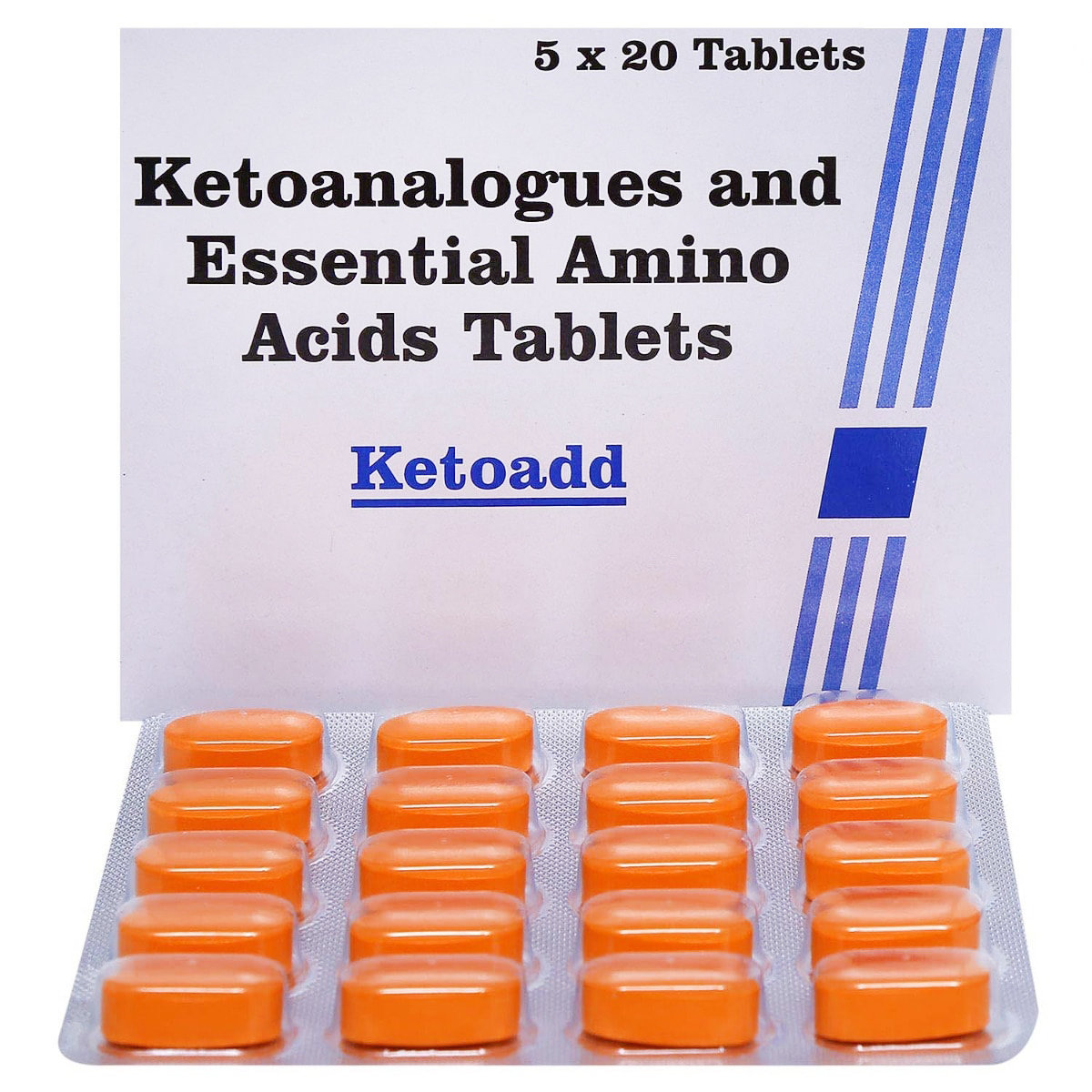
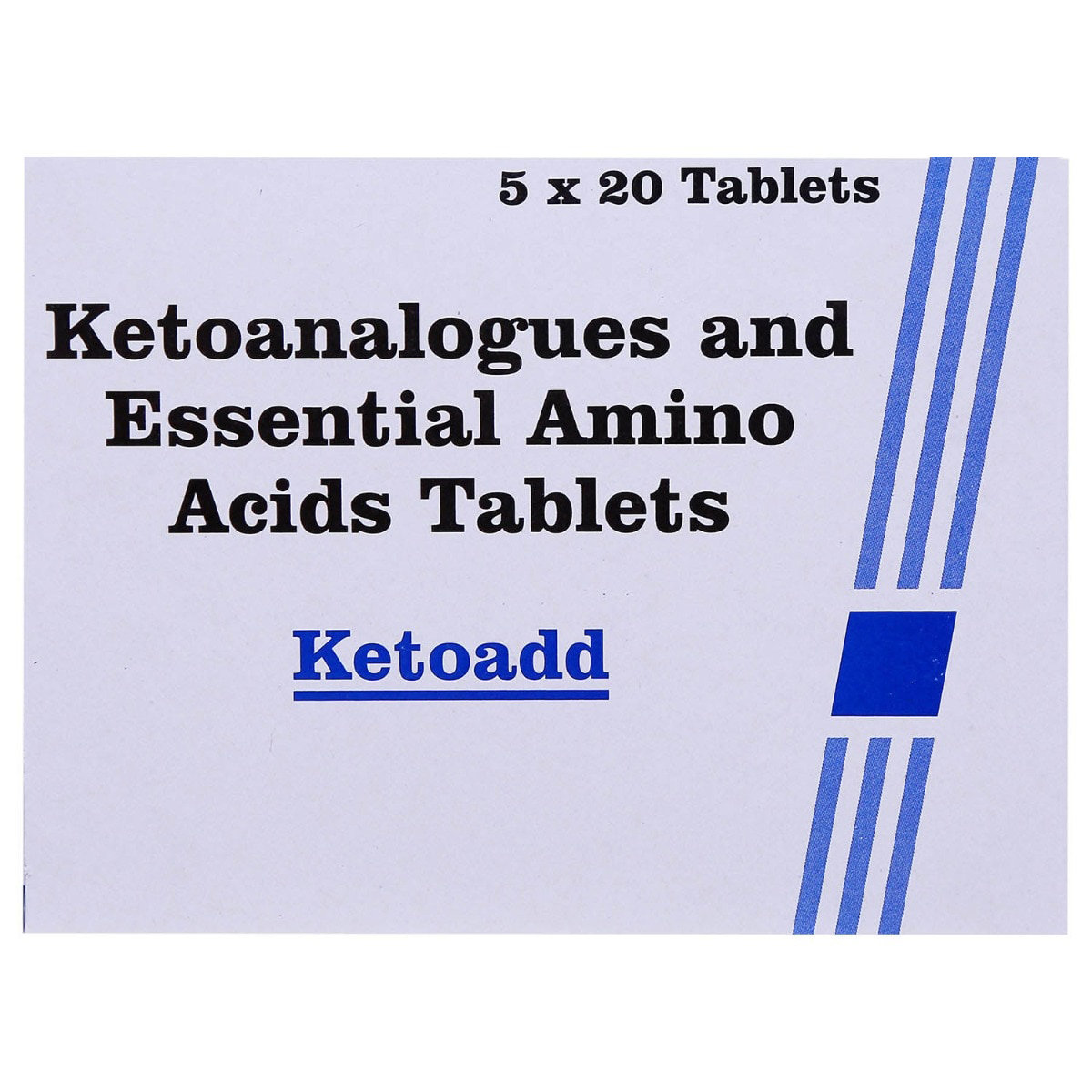
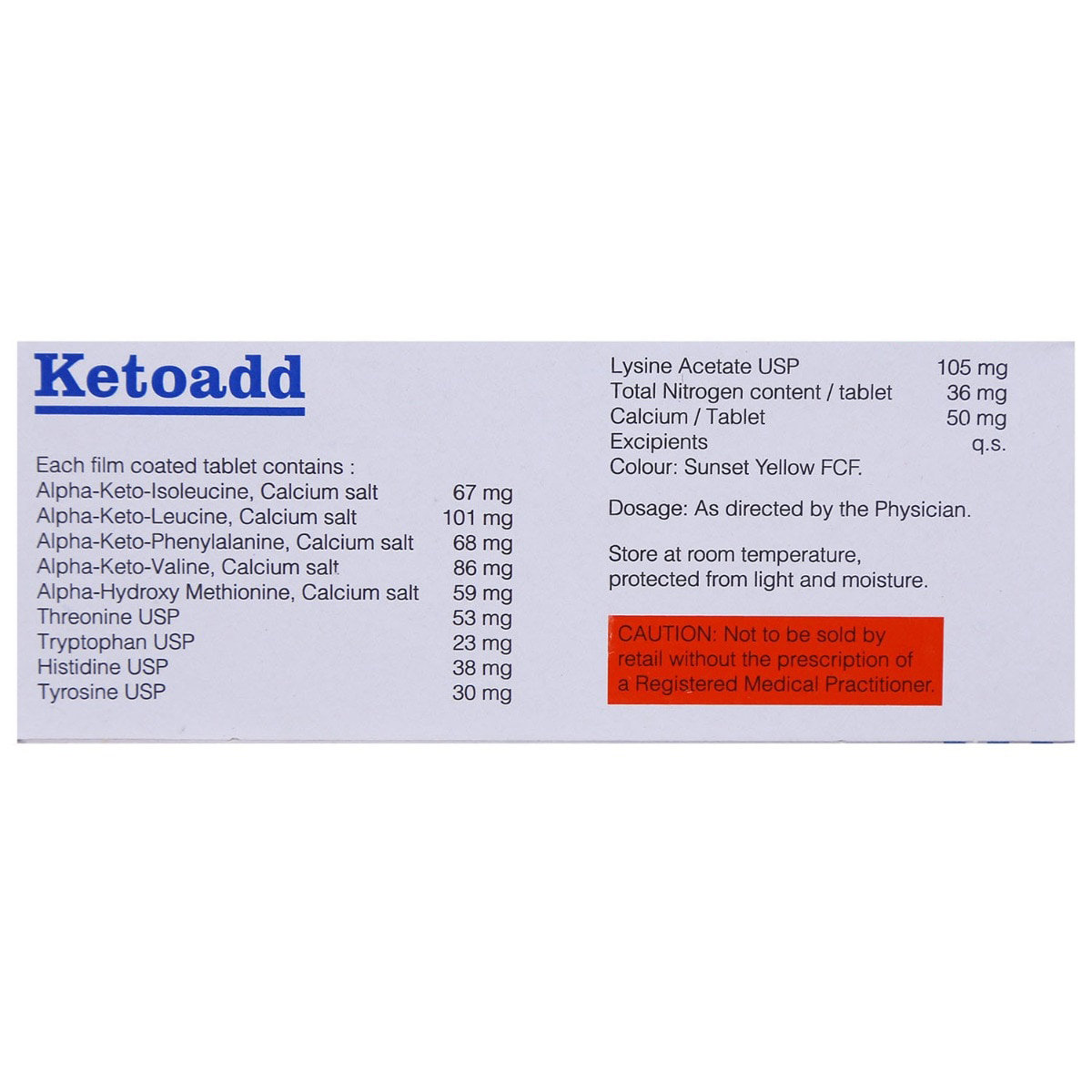
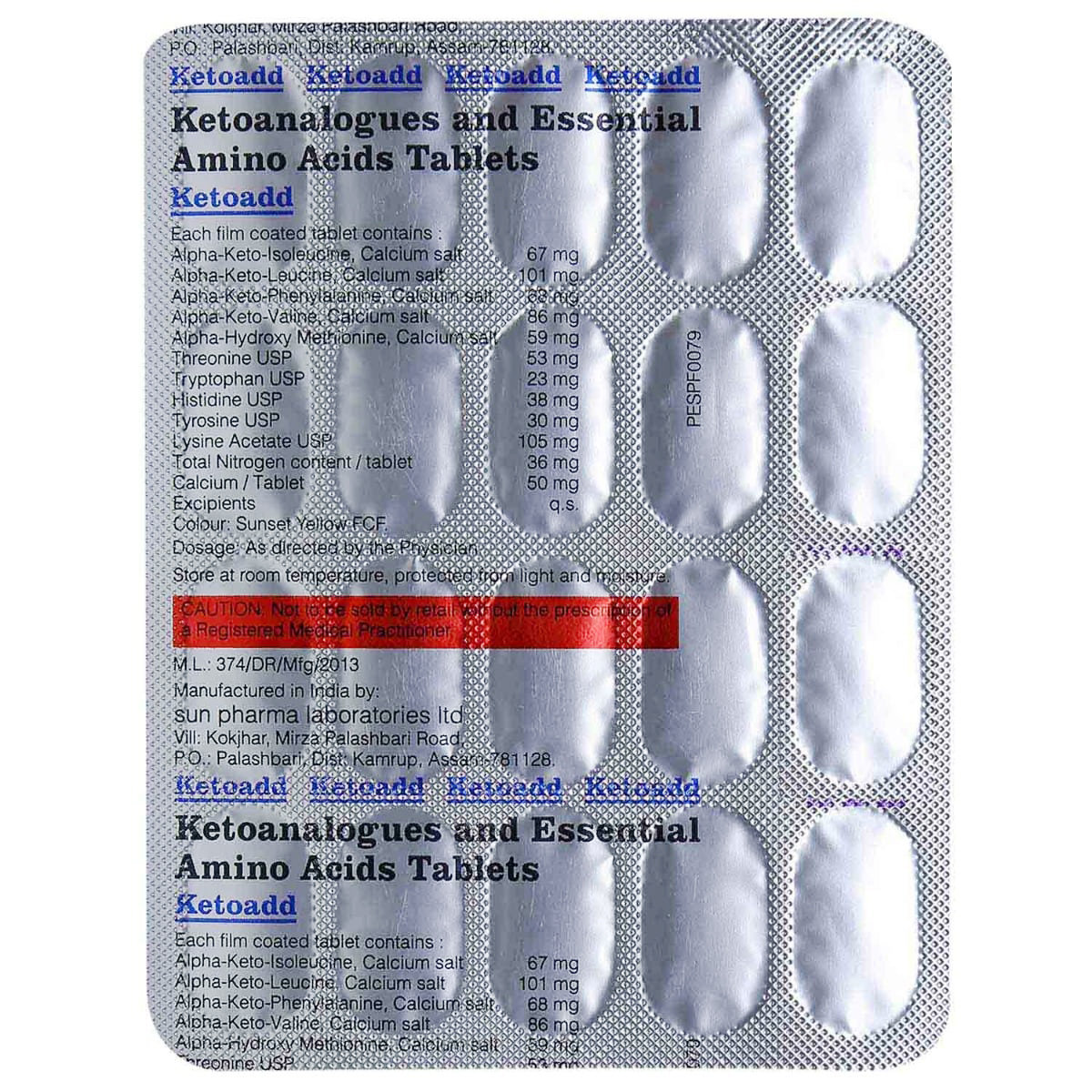
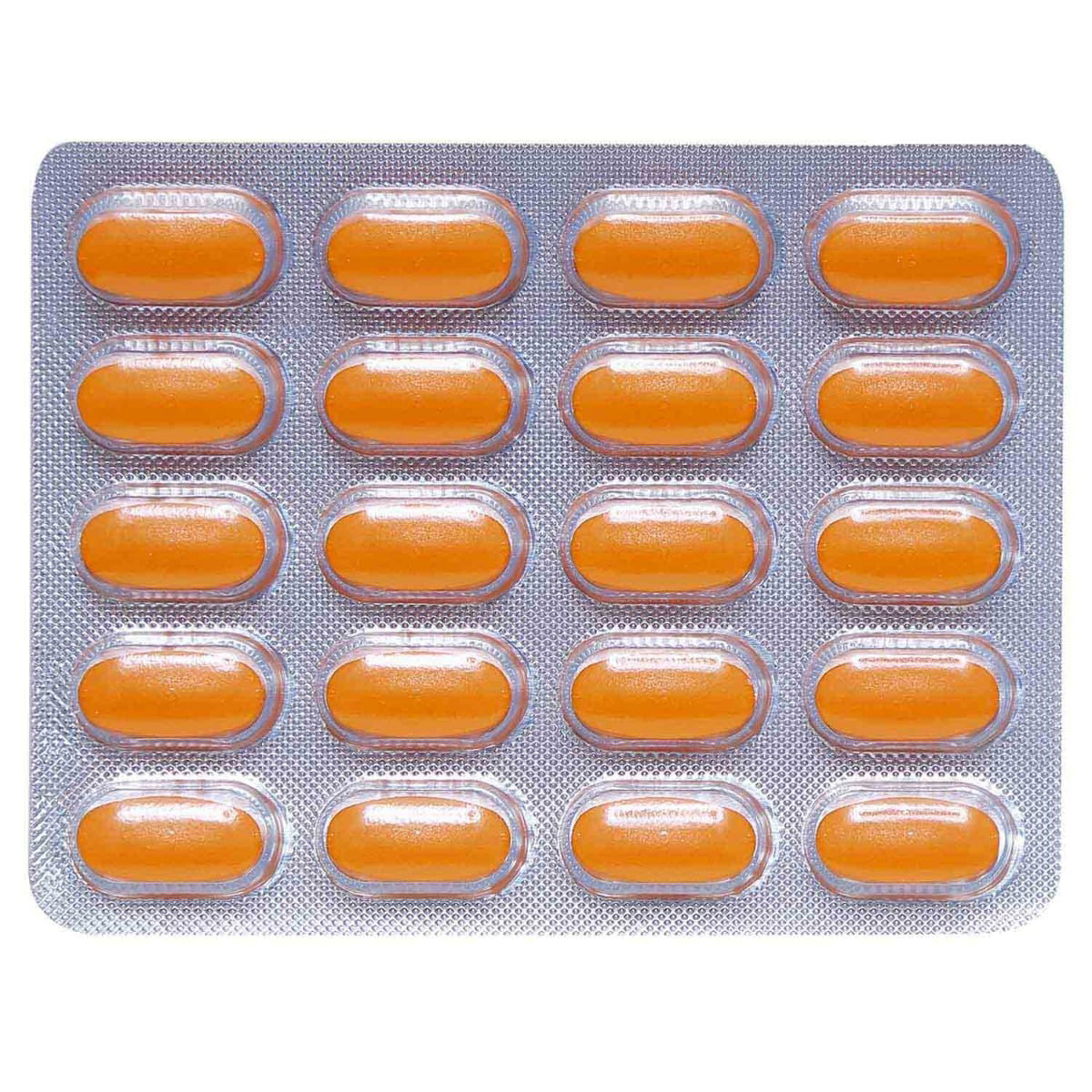







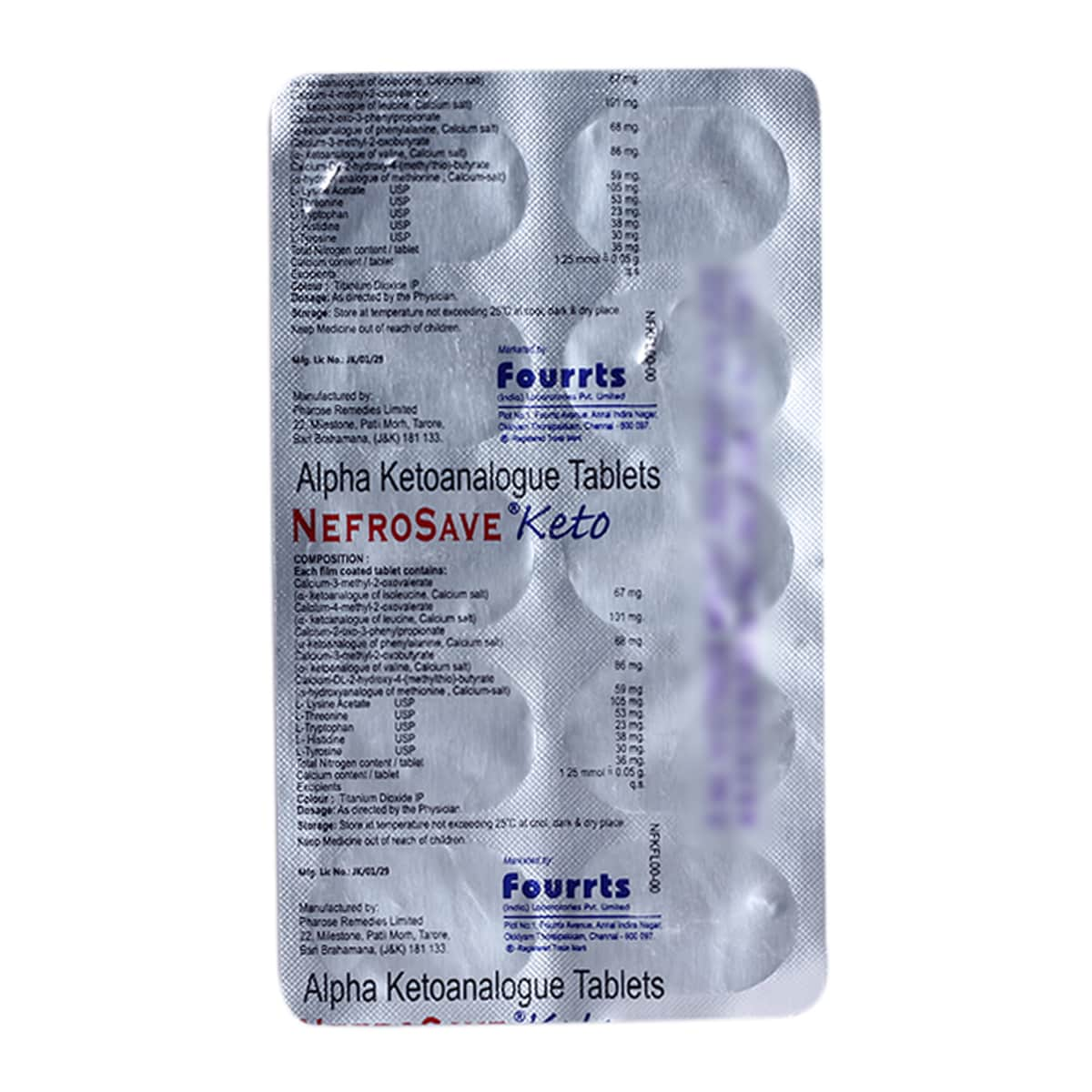
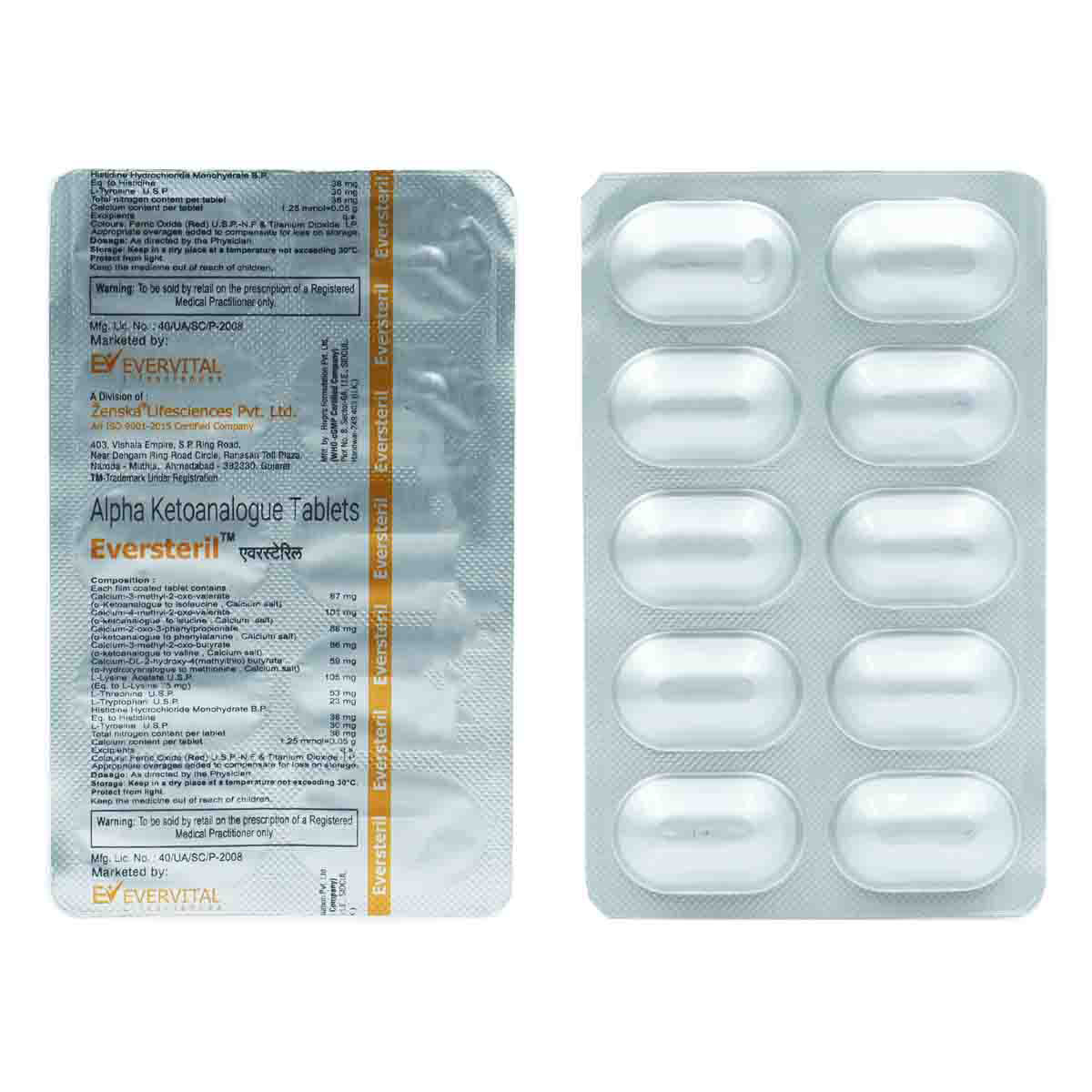


_0.jpg?tr=q-85)
